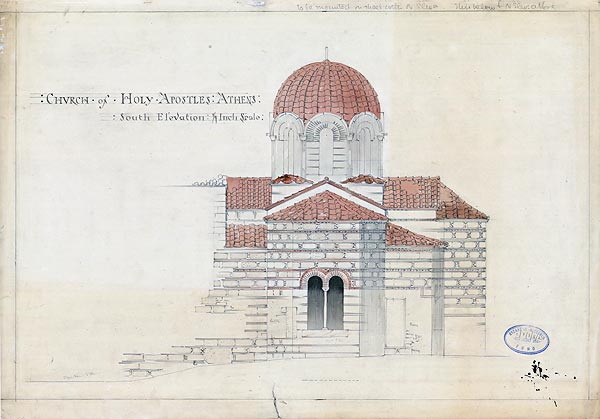About the BRF Collection

The Byzantine Research Fund Archive (BRF) is a unique collection of architectural drawings, photographs and notebooks created from the late 19th century to the middle of the 20th century by a small team of British architects trained in the Arts & Crafts tradition whose studies of Byzantium shaped the Byzantine Revival in later years.
The collection contains over 1,500 drawings and 1,000 photographs, numerous notebooks and the corporate records associated with the Byzantine Research and Publication Fund, the original body created in 1907 to support this work. Although the Fund was associated with the BSA from the time it was founded, it was not until 1937 that the BSA formerly took over the property and operation of it. The BRF Archive contains records of Byzantine monuments in Greece, Turkey, Italy, the Near East, Egypt, and Cyprus. In some cases, the collection contains the only record of a monument before its destruction in modern times, the most important example being the church of Hagios Demetrios in Thessalonike which was almost completely destroyed in the Great Fire of 1917 shortly after being recorded by one of the BRF architects, Walter Sykes George. It also contains personal records of the following architects; Robert Weir Schultz, Sidney Howard Barnsley, Walter Sykes George, William Harvey, Harold Swainson, Peter Gus Corbett, and A.H.S (Peter) Megaw. The aspirations of the BRF Archive Project today are to make these materials accessible to a wide range of researchers.
Part of east elevation. This is a preliminary drawing. It is labelled in pencil (S. George Androusa Messenia) in the upper left-hand corner.
Gallery plan (with plans of the domes). This is a preliminary drawing. It is annotated in pencil: 'Christianoupolis Gallery Plan 1/2 Scale).
Ground plan. This is a preliminary drawing. It is annotated in pencil: 'Christianoupolis Gallery Plan 1/2 Scale).
Detail of the windows. This is a preliminary drawing. It is annotated in pencil: 'Christianoupolis 3'.
Detail of the windows. This is a preliminary drawing. It is annotated in pencil: 'Christianoupolis 4'.
Plan. The drawing is labelled in ink: 'A Plan of the Church'.It is entitled in pencil in the upper left-hand corner: 'Messenia Samari'. It is numbered (No 1) in pencil in the upper right had corner. This drawing was part of the 1936 Exbhitiion at the Royal Academy and was panel 507 in the catalogue
Plan of the church with plan of the domes.
Plan of the church with plan of the domes. This is a preliminary drawing. It is annotated in pencil.
Longitudinal section. This is a preliminary drawing. It is labeled in ink: 'Section Looking North'. It is numbered in pencil (no 2) in the upper right-hand corner. It is annotated in pencil.
Transverse section with iconography. This is a preliminary drawing.
Transverse section. This is a preliminary drawing.
Transverse section looking east with iconography. This is a preliminary drawing. I This drawing was part of the 1936 Exbhitiion at the Royal Academy and was panel 508 in the catalogue
Baptestery: Carved panel. The drawing is entitled in ink: 'Carved Panel in Baptestery probably reused from some other position.
Batpistery: The cruciform font (section/elevation/plan). The drawing is entitled in ink: 'Baptestery- Crusiform Font'. Further annotation in ink survives.
Batpistery: Section of nave (north arcade). The drawing is entitled in ink: 'Baptestery - Section of Nave, Arcade looking North'. Further annotation in ink survives.
Baptestery: Details of narthex doors (plans/elevations/ sections). The drawing is entitled in ink: 'Baptestery - Details of Narthex Doors, Side Toward Narthex'. Further annotation in ink survives.
Panagia church: Apse of the bema (section/elevation/plan of the throne). The drawing is entitled in ink: 'Great Church - Apse of the Throne'. Further annotation in ink survives.
Panagia church (Archpriest's throne): Side elevation, Details of sculpture. The drawing is entitled in ink: 'Great Church - Archpriests Throne'. Further annotation in ink survives.
Panagia church: Ciborium (details). The drawing is entitled in ink: 'Great Church - Details of Ciborium'. Further annotation in ink survives.
Panagia church: Ciborium (details). Te drawing is entitled in ink: 'Great Church - Details of Ciborium'. Further annotation in ink survives.
Panagia church (iconostasis): Elevations/details. The drawing is entitled in ink: 'Great Church - Details of Iconostasis'. Further annotation in ink survives.
Panagia church (south transept): Aisle and gallery arcade. The drawing is entitled in ink: 'Great Church - South Transept'. Further annotation in ink survives.
Panagia church:Capitals (elevations/details). The drawing is labelled in ink: 'Capitals'. Further annotation in ink survives.
Comparison of Roman and Byzantine details. The drawing is annotated in ink.
Panagia church (north transept): Gallery window (plan/elevation/details). The drawing is entitled in ink: 'Great Church - Gallery Window North Transept'. Further annotation in ink survives.
Panagia church: West clerestory window (section/elevation/plan/details of decoration). The drawing is entitled in ink: 'Great Church - Details of West Clerestory Window'. Further annotation in ink survives.
Panagia church: Marble window fillings (plans/elevations/details). The drawing is entitled in ink: 'Great Church - Details of Original Marble Window Fillings'. Further annotation in ink survives.
Panagia church: Doorway from south transept to prothesis (sections/elevations/plans). The drawing is entitled in ink: 'Great Church - Doorway from South Transept to Prothesis'. Further annotation in ink survives.
Panagia church: Inner narthex doorways (plans-elevations-sections). The drawing is labelled in ink: 'Inner Narthex Doorways. It is entitled in ink: 'Great Church'. Further annotation in ink survives.
Gallery section. The drawing is labelled in ink: 'Gallery Between the Small and Great Churches'. Further annotation in ink survives.
Sections of openings. The drawing is labelled in ink: 'Doorway from the North Gallery of Small Church to the Gallery between the Small & Great Churches'.
Panagia church: Wall arches, Gallery above narthex. The drawing is labelled in ink: 'Wall Arches, Gallery above Narthex, Great Church'.
Church of Hagios Nikolaos: 'Details of Apse Window'. The drawing is entitled in ink: 'Small Church - Details of Apse Window'.
Church of Hagios Nikolaos - Plan, Elevation and Section of apse. The drawing is entitled in ink: 'Old Church - Apse and Bema'. Further annotation in ink survives.
Gallery opening between Hagios Nikolaos and Panagia. The drawing is entitled in ink: 'Gallery Opening between the Old and the Great Churches'. Further annotation in ink survives.
Church of Hagios Nikolaos, Details of nave arcade (elevation, plan). The drawing is entitled in ink: 'Old Church - Details of Nave Arcade'. Further annotation in ink survives.
Church of Hagios Nikolaos, Section of vault built to replace old narthex vault. The drawing is annotated in ink.
Church of Hagios Nikolaos, Inner doorways of narthex (jambs, lintels, sections through heads of central and side narthex doors). The drawing is entitled in ink: 'Old Church - Narthex Doors Toward North Transept of Great Church'. It is annotated in ink.
Baptestery: Floor mosaic. The drawing is entitled in ink: 'Baptestery - Remains of Mosaic Floor East End of North Aisle'. Further annotation in ink survives.
Church of Hagios Nikolaos, Cross-section. The drawing is labelled in ink: 'Cross-Section looking East'.
Church of Hagios Nikolaos, Cross-section. The drawing is labelled in ink: 'Cross-Section looking West'.
Ground plan with the names of the churches and the chapels. This is a preliminary drawing. It is entitled in ink: 'Key to the Names'. It is annotated in ink and in pencil.
Plan of the buildings. The drawing is annotated in ink.
Plan of the galleries. The drawing is annotated in ink.
Plan of the roofs. The drawing is entitled in ink: 'A Plan of the Roofs'. It is annotated in ink.
Comparison of plans: the Small church (left) - Church at Bin-Bir-Kilisse, Cappadocia (right). The drawing is annotated in ink.
Reconstructed plans: Plan of the churches (left) - Plan of the galleries (right). The drawing is entitled in ink: 'Reconstructed Plans'. It is labelled in ink: 'A Plan of the Churches (left) - A Plan of the Galleries (right). Further annotation in ink and pencil survives.
Upper row: East elevation - Lower row: North elevation (left), South elevation and Section through Baptistery. The drawing is labelled in ink: 'East Elevation', 'North Elevation' and 'South Elevation and Section through Aisle and Narthex of Baptestery'. Further annotation in ink survives.
Upper row: Longitudinal section through Old church and Great church - Cross section through Old church and Great church. The drawing is labelled in ink: 'Longitudinal Section through old Church and North Aisle and Transept of Great Church', 'Cross Section through Old Church and the Bema of Great Church', 'West Elevation showing Sections of Dwelling Rooms', ' Longitudinal Section of Baptestery'. Further annotation in pencil survives.


